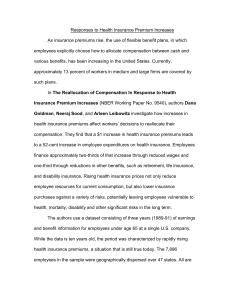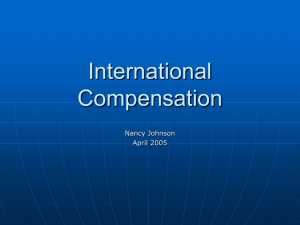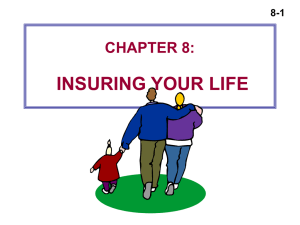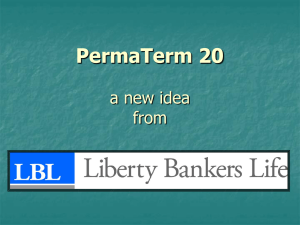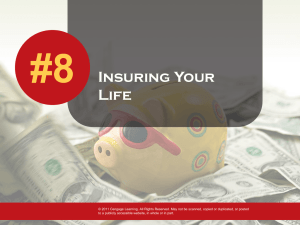insurance policy
advertisement
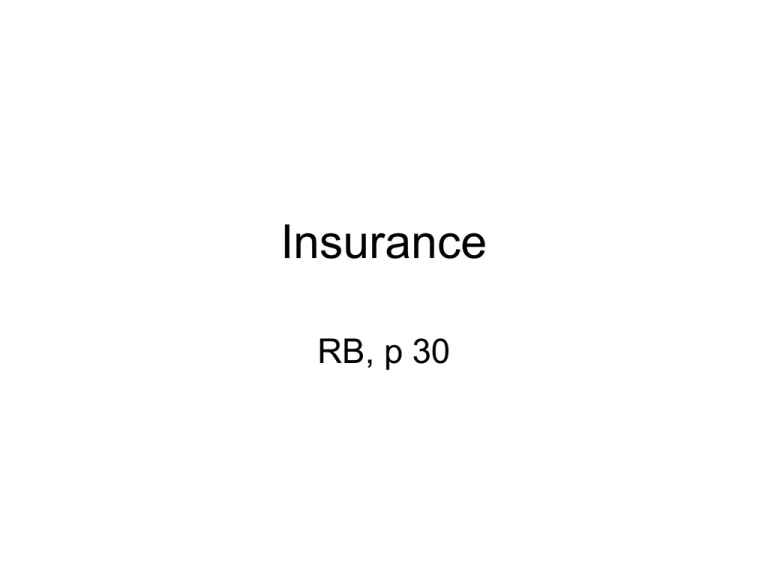
Insurance RB, p 30 • Insurance is like marriage. You pay, pay, pay, and you never get anything back. • Al Bundy • The chief beneficiary of life insurance policies for young, single people is the life insurance agent. Wes Smith Want to take out an insurance policy? Put in the right order: M contact an insurance agent or broker G file/submit a claim in case of an accident D consider the risks you face A decide to insure sth. against an accident/ theft or damage (or: seek insurance cover) S receive compensation / indemnity A contract an insurance policy and pay a premium for the insurance cover E the insurance company settles a claim Write the letters in the right order... Want to take out an insurance policy? Put in the right order: D consider the risks you face A decide to insure sth. against an accident/ theft or damage (or: seek insurance cover) M contact an insurance agent or broker A contract an insurance policy and pay a premium for the insurance cover G file/submit a claim in case of an accident E the insurance company settles a claim S receive compensation / indemnity DAMAGES or indemnity → RB, p 30 Where does your premium go? claims pool of premiums overheads investments industry government individuals profits Describe the graph! • As can be seen from the graph, thousands of people pay _____________ to insurance companies, which use the money to pay ____________, fixed and variable costs. The rest of the pool of premiums can be ______________ in the form of lending to ___________, ___________, or _____________ in order to earn _____________. In this way insurance companies become large institutional investors that place great sums of money in various securities. Describe the graph! • As can be seen from the graph, thousands of people pay premiums to insurance companies, which use the money to pay overheads, fixed and variable costs. The rest of the pool of premiums can be invested in the form of lending to industry , government, or individuals in order to earn profit. In this way insurance companies become large institutional investors that place great sums of money in various securities. WHAT DO THEY DO? • • • • • UNDERWRITER BROKER INSURER POLICY HOLDER LOSS ADJUSTER WHO IS IT? • The person charged with evaluating an insurance claim to determine the insurance company's liability under the terms of an owner's policy. WHO IS IT? • The person who evaluates the risk and exposures of potential clients. S/he decides how much coverage the client should receive, how much they should pay for it, or whether even to accept the risk and insure them. WHO IS IT? • A person or organization that has an insurance policy. S/he receives the specific types of coverage (life, health, etc.) stated in the policy, subject to the payment of premiums, usually on a monthly basis. WHO IS IT? The party to an insurance arrangement who undertakes to indemnify for losses. WHO IS IT? The person who works with many insurance companies to find the very best available policies for his or her clients. Pair the halves of sentences: • 1. It is important to keep the value of your policy • 2. Make sure you get insured • 3. When you say what you want your insurance to cover, • 4. If an accident does happen, • 5. If the company agrees to your claim, • • • • • a) you make a claim to the insurance company. b) against accidents. c) you receive compensation. d) then the broker will tell you which policy you could take out. • e) closely linked to the value of your property. • 1. It is important to keep the value of your policy closely linked to the value of your property. • 2. Make sure you get insured against accidents. • 3. When you say what you want your insurance to cover, then the broker will tell you which policy you could take out. • 4. If an accident does happen, you make a claim to the insurance company. • 5. If the company agrees to your claim, you receive compensation. Lloyd’s tsunami exposure limited (R, p40) • Explain the headline in simple terms! • Explain the following: - unscathed - property claims - limited/minimal exposure - reinsurers - penetration of insurance - insured losses - insurance spent per head - exclusions for “acts of God” - the worst on record in terms of... - softening of premium rates Optional hw: STRUCTURED NOTES VOCABULARY • unscathed – not harmed or injured • reinsure – to share the insurance of something between two or more insurance companies • penetration (of insurance) – MARKETING – how much of a particular market insurance sales cover • exposure – the amount of money (the insurance) company risks losing • property claims – insurance claims for property that has been damaged • soft (premium) rates – falling because supply exceeds demand ( = a soft insurance market) Revision: fill in the missing prepositions • • • • • • • • • • • • face risk / face a risk ____ fire insure ______ risk / burglary / theft / injury to be covered _______ loss two parties ____ an insurance contract receive money ____ premiums pay money ____ compensation penetration ___ insurance worst year ___ record big number ___ insurance terms compared ____ $ 2000 ___ head exclusions ____ “acts ___ God” an analyst ___ Numis Securities / PBZ / CNB Revision – fill in the missing prepositions • • • • • • • • • • • • face risk / face a risk of fire insure against risk / burglary / theft / injury to be covered against loss two parties to an insurance contract receive money in premiums pay money in compensation penetration of insurance worst year on record big number in insurance terms compared to $ 2000 per head exclusions for “acts of God” an analyst at Numis Securities / PBZ / CNB BREAK Preparing for the written and oral exam • • • • • • • • • • read each relevant text underline unknown words/expressions find their meaning (dict., note-book, slides, web,...) make sure you understand all the text consider the various related texts and materials as elements contributing to your general understanding of a certain topic see which of the words/expressions in the texts were important for this topic (slides, notebook, vocabulary sections in MK and Reader) explain their meaning in simple English retell the main message of each text orally be prepared to discuss various topics and present your personal views Think what ex. could be expected in the test Types of exercises you can expect: • • Read the definition/explanation and provide the right term Supply the missing word to make strong word partnerships, use the expression to answer a question • Match words to create strong word partherships and use the expressions to write about a (given) topic • Find the odd one out & explain your answer • Complete the text by filling in the missing words • Fill in the missing prepositions • Compare X and Y • Discuss advantages and disadvantages of X • Downtone the following sentences (Lang. of meetings - PE2) • Graph description (PE 2) – fill in exercise • Group words and expressions according to topics • Write a report • Translate (key terms) into or from Croatian → REVISION
